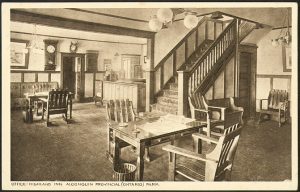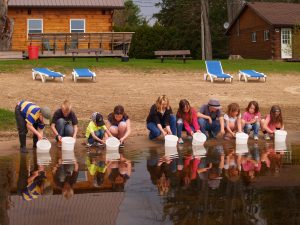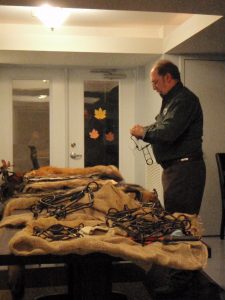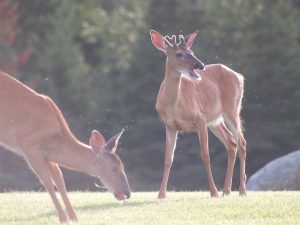CONSERVATION by Ralph Bice
From December 13, 1978
The word “conservation” has been bandied about so much the last few years that it is a bit hard at times to really understand what it means. I have looked for the meaning several times in different dictionaries and they are usually about the same. The copy l have in front of me as l am writing is Winston and this one was used by school children more than forty years ago. It defines the word as “the prevention of loss or waste, especially of natural resources, as forests or water power or of game birds, wild flowers, etc.” Must have been written by a city man. We will take it for granted that the “etc.” means animals and fish as well.
Another definition l saw said it meant perpetuation of all forms of wild life, animals and vegetation for the benefit of future generations. Only thing, the word is used so many times when one almost (if you are reading an article or listening to a discourse) hardly knows what the word means.
I well remember a party l guided for many years. Good crowd and they surely liked fishing. One of the gang was quite prominent in all game and fish organizations and could really talk on the subject. His theory, and this idea was taking a firm hold on most outdoorsmen, was that while we should enjoy fishing and should always remember that there will be another generation coming and again more after that and that there should be fish and fishing for everyone. But when he got into a canoe and the fish were biting his splendid theories were just a thing of the past.
For a few years, against many complaints, fishermen were allowed to take home two day’s catch. At that time fishermen were allowed five lake trout and 15, or ten pounds of speckled trout per day. So you can see what a load of fish four men could take home, all perfectly legal.

When the Highland Inn was so popular at Cache Lake in Algonquin Park many guests liked to stay at the hotel and just go on day fishing trips. There as the limit of course but it was considered alright by the powers then in control to bring in as many fish as you could catch. These were just turned into the hotel and many guests had a meal or several of lake trout. This was discontinued when someone began to realize that the small glacial lake did not contain an endless supply of fish. I have not been on any of those little lakes for years but they certainly took a beating for quite a long time.
When fishing began to shows sign of depletion, this quite a few years back, the limit was cut to three fish per day. Speaking of lake trout the limit on speckled trout was also reduced to one day’s catch.
There was a bit of a fuss made but mostly by persons who think a trip into the woods means catching a lot of fish. I contacted many fishermen and they were almost 100 per cent in favour of a reduced limit. These were the men affected. The people who complained thought that it would lower the number of visitors coming to the area. This proved wrong, as more and more came fishing. So much so that the condition of fishing in Algonquin Park is not in the best condition.

There have been cries for re-stocking and after many trials and tremendous cost it is now believed that fish, and I am speaking of lake trout, must be stocked in a lake similar to the one from which the parent stock was captured. In a few years we will perhaps see portable hatcheries that can be moved to any larger lake. It is easy to stock creeks and lakes with speckled trout as they seem more adaptable. Also bass. But most of the fishing, especially during the summer, is for lake trout.
For many years deer were taken in Ontario. The place where they were the most plentiful was in Algonquin Park. A very bad period from 1925 to about 1935, but for years after that the deer population was very high. In spite of heavy hunting the deer seemed to get more plentiful. So much so that the District Forester at Pembroke put out a feeler about allowing a hunt in the Bonnechere deer yard which is in Algonquin Park. He thought it might relieve the pressure on some areas and it was felt that there were too many deer in that yard. The response of the public was quick. No hunting. No one listened to any reason; just that hunting was not to be permitted in the Park. No mention was made of any other area just that one spot where there were too many deer. So the project was dropped. That was in 1958. Came the bad winters of 59-60 and 60-61 and many thousand deer died in those yards.

The wolf population had increased as they do when game is plentiful and they were just as hungry when the herd got so much smaller. It is now an event to see a deer in the Park.
Lots of letters in the daily papers about hunting. Again, no one gives any reason. Just stop hunting. Only thing, when the Ministry asked for help in feeding deer during the winter season it was the hunters they went to for help, not the nature clubs. One woman wrote asking wolves that were killing her sheep be live trapped and moved somewhere else. They could kill sheep on any farm but hers. One letter claimed we must have wolves to keep nature in balance. The writer did not explain how the areas where there are no wolves produce more deer than in Ontario. Michigan, in 1977, harvested 150,000 deer. No wolves. Ontario, an area many times larger, harvested about 13,500. Same with other states. No wolves, plenty of deer. But still here in Ontario the wolves have more friends than the hunters.
There is a small park in southwestern Ontario that has now about three times the number of deer that the food warrants. But nature groups set up a terrible howl when hunting is mentioned. Few years back one group was going to trap the deer and take them away. Such a fiasco. Never made the papers like killing a wolf on Lake Simcoe. But after they killed a number of deer the idea was dropped.

There has not been much that would warrant the title I used. But some time soon there has to be some controls. Our newest province decides how many moose or caribou they should shoot and sell licenses accordingly. Only so many hunters to an area. And hunters must draw for special areas. The drawing is done in July and hunters have a second and maybe a third choice if they miss out on the area they want.
Sooner or later we will have to have some controls on hunting and fishing. If things are worth keeping they are worth controlling. A lesson might be taken from the Ontario Trappers. In spite of heavy trapping, records show that until the last few years the take of fur bearing animals has increased where there is trapping. At the same time there are more fur bearing animals in Ontario than when the white men first came. So, maybe trappers are right when they claim to be the only practicing conservationists.
